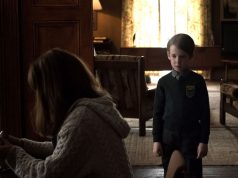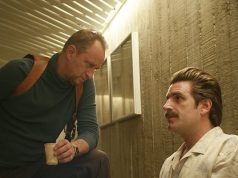The title character in “Schultze Gets the Blues” is a spiritual brother to the title character in “About Schmidt.” Jack Nicholson’s Schmidt and Horst Krause’s Schultze had very different jobs — Schmidt was an insurance man; Schultze was a coal miner — but both find their lives cast into upheaval by the prospect of retirement, discovering that without their jobs, they have no idea what to do with themselves. The films are both droll, poignant looks at what happens next.
“Schultze” is a deadpan film with few close-ups and little camera movement, first-time writer/director Michael Schorr’s demeanor apparently as unobtrusive as Schlutze’s. Still, Schorr manages to be dryly funny at times, beginning with the first shot: opening titles accompanied by joyful zydeco music stop abruptly and are replaced by a shot of four scowling Germans riding silently in a mine-shaft elevator. You thought you were in for a wacky time, but no: scowling Germans.
Schultze is a rotund, unmarried man who, at the film’s outset, takes his age-mandated retirement and goes home. He plays accordion for his town’s little music club, a conservative group that favors traditional polkas and such, and hangs out with his two fellow retirees Manfred (Karl Fred Muller) and Jurgen (Harald Warmbrunn), but that’s not enough to occupy the rest of his life. If he has given thought to what he will do without the mine to go to every day, he does not show it. He seems neither alarmed nor depressed by his sudden inactivity; you get the impression life was never very interesting for him to begin with.
One night he is scanning radios stations — avoiding a news report on cancer rates in miners — and stumbles on a bit of zydeco, the accordion-based music of the Louisiana cajuns. He has never heard anything like it. He is startled to discover that he loves it, even though it is completely different from the staid, dull music he’s used to. He picks up the tune on his own accordion. The next day, he goes to his doctor to see if something is wrong with him: Schultze is so boring, he thinks the onset of becoming interesting might be life-threatening.
Soon he is obsessed with this new music, and with the culture that accompanies it, going so far as to cook jambalaya for Manfred and Jurgen. (They find it too spicy.) Yet his interest doesn’t extend to locating CDs or sheet music of zydeco songs. Instead, he continues to play the one song he heard on the radio that night, the music serving as a symbol of his new lease on life, the moment he found something to latch onto in his post-retirement world.
As luck would have it, his music club is sending a representative to Texas for a music festival, and Texas is not far from zydeco’s homeland. Despite the general disapproval of Schultze’s new fondness for non-traditional accordion music — the Germans are fearful of dramatic changes, perhaps because of what happened the last time they embraced something drastic — Schultze is selected to take the trip.
This is an uncommonly good-natured and simple film, bearing no malice, holding no agenda, desiring no undue attention. Schultze is a dull man, but he’s not a dull character. On the contrary, he is droll and amusing to behold, shuffling through life as an unimportant cog in the machinery of society. What the film suggests, subtly and sweetly, is that you can find contentment without having to go out and change the world. Even the cogs can be happy.
B (1 hr., 48 min.; in German with subtitles; )





